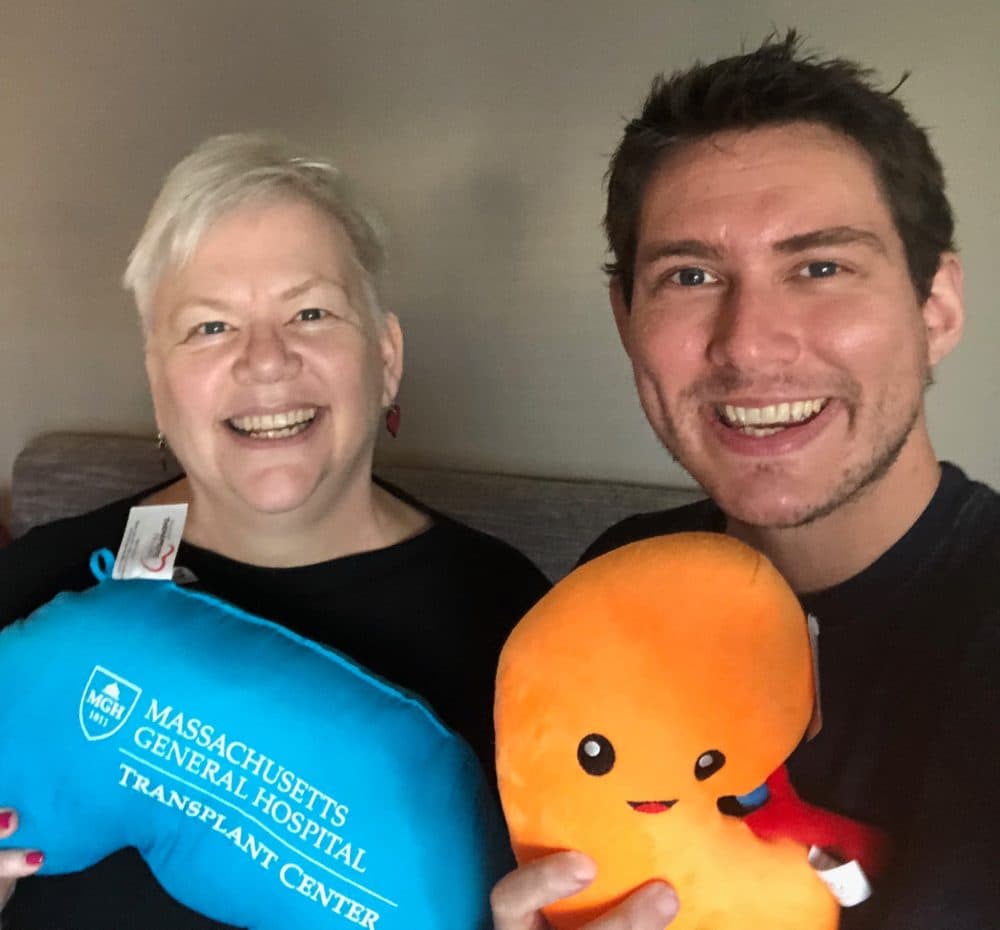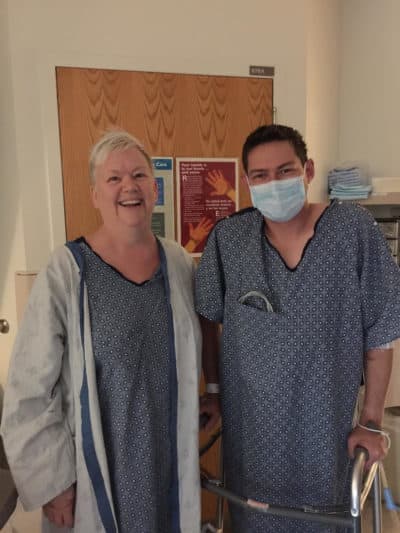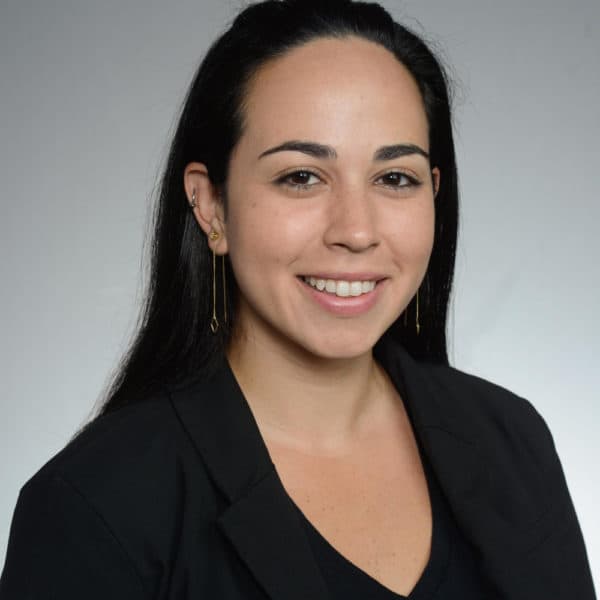Advertisement
Two Mass. Teachers Solidify A Friendship With A Life-Saving Organ Donation
Resume
(Listen to this story starting at 7:12 on the Kind World podcast episode "Finding Hope By Giving Life")
Seven years ago, Michael Romano went for a jog through his neighborhood in Somerville, Mass. It was a typical summer day for the high school science teacher.
The last thing he expected was that his run would be the start of a life-changing medical journey.
Michael said he started feeling symptoms of a heart attack that evening, so he went to the emergency room. Doctors told him his heart was fine, but his blood chemistry was off, so they ran some additional tests.
"After they did an ultrasound, they saw these large cysts all over both of my kidneys and they said, 'You know, that's pretty characteristic of polycystic kidney disease,' ” he recalled.
Polycystic kidney disease is a genetic disorder that causes cysts to develop over time and reduce the function of the kidneys. The disease usually has no symptoms and isn’t generally tested for, so the real miracle was that doctors were able to diagnose Michael before disaster struck.
"They said, 'It was kind of nice that that brought you in here, because we might not have caught this otherwise until the kidneys were totally failed several years down the road,' " he said.
Doctors told him there was no cure and no treatment for the disease — just symptom management and monitoring. Michael was in shock, but he went on with his life, now keeping a closer watch on his health. By 2017, his situation started to head south. Though he was in his 30s, doctors told him his kidneys were functioning as if he were in his 50s or 60s.
Michael said he started feeling exhausted more often, especially after teaching all day. He was waking up frequently at night to go to the bathroom. He started getting more concerned about traveling, and thinking more deeply about insurance and back-up plans in case of an emergency.
Soon, his kidney function reached a critical point, giving him three options: "Transplant, dialysis or death," he said.
Michael didn’t want to go down the path of dialysis if he didn't need to, so that left the hope of a transplant. He signed up for the National Kidney Registry, which matches donors with patients in need, and his family and friends got tested to see if they could donate. None were a match.
"You hear some statistics about kidney donation, and the number of people waiting for kidneys, and people passing away from lack of receiving a kidney," he said. "But you just think, 'I'm not going to be one of those statistics. I'm going to work harder and smarter to find someone. I have lots of friends, and I have lots of people on my network, so of course I'll find someone.' "
A year went by and he still had no luck. His parents even considered putting up a billboard in case a stranger were willing to donate to their son. In January 2018, Michael — who considers himself a pretty private person — decided to step out of his comfort zone and go public with his request.
Advertisement
Very public.
"I just sat down and started writing a Facebook post," he said. "I took — I thought — a pretty great selfie of me with this stuffed kidney someone had given me. I put in some statistics from [the] National Kidney Foundation and posted it on Facebook, and just kind of waited to see what happened."
Michael’s heartfelt post was shared more than a thousand times, with people all over the country asking if they could donate a kidney. He was floored. And so was his treatment team.
"I didn't actually tell them I was going to do this," he said. "So one day, there was just this inundation of people all of a sudden filling out my form and my transplant coordinator called and said, 'Did you do something?' "
Doctors sorted through the offers to see who could be a donor. Out of everyone who filled it out, 60 people matched his blood type — O. Then, they narrowed the search down to just two people.
Surprisingly, at the top of the list was 57-year-old Genevieve Hammond — Michael’s colleague at Acton-Boxborough Regional High School.
Genevieve had just spent a year entangled in the medical system herself, and was still grieving the recent loss of her mother, who died after a difficult fight against cancer.
Her mother, who was 79 when she got her diagnosis, was prescribed a full course of radiation and chemotherapy. She was in constant pain and spent months in the hospital and various rehabilitation centers. And though Genevieve says her mother received excellent medical care, her bedside care left a lot to be desired.
"As kind as everyone was and as well-meaning as they were, it didn't feel like they really got it, and it just didn't seem that hard to get," she said.
After six months of treatment, rehab and chronic pain, Genevieve’s mother was deemed cancer-free. But in November of 2017, she died.
"As kind as everyone was and as well-meaning as they were, it didn't feel like they really got it, and it just didn't seem that hard to get."
Genevieve Hammond
Genevieve was devastated, but she dove right back into her teaching job after the winter holidays, barely giving herself time to grieve.
Then she saw the Facebook post requesting a kidney from her colleague and friend Michael.
"I've known him really well, and yet he's very reserved," she said. "And it was the idea that he would share this information publicly, in such a big public forum. It really felt urgent to me. His vulnerability made me feel like it was important to match that and and meet that."
So Genevieve, who was in a vulnerable place herself, filled out Michael’s donation form. A few weeks later, the treatment team called her to say she was officially in the running to be Michael’s donor.
"I was sitting at my desk in my classroom, and it was like a thunderbolt," she said. "You know, it really was like, 'Oh my God, this is so cool.' "
Michael and Genevieve then started an endless array of tests. And that’s when Genevieve started to see a different side of the medical community — the care and compassion she was shown throughout the testing process from physicians, surgeons, nurses, social workers, mental health providers. She says she felt herself opening up and sharing her complicated feelings about her mother's death. And she realized she jumped into this life-changing choice for an unexpected reason: as a way to channel her grief.
"And so when people say like, 'Do you think it has to do with your mother?' Yeah, I think it does," she said. "It’s not going to make it go away, the way she died or that she died. But it just allowed my emotions to be on my sleeve more than I think we let ourselves be most of the time."
That summer, Genevieve got the call she was waiting for: She could donate one of her kidneys to Michael. She wanted to share her news with him right away.
Michael remembers her calling him and asking to go to dinner — "almost like a proposal."
"It was just really exciting, and she seemed almost equally excited as I was, which I remember being very surprised about," he said. "She was just overwhelmed and completely thrilled that she could give me a kidney. And that made it even more emotional and more touching."
Genevieve also remembers the emotions they both felt in that moment.
"I could tell he was choked up, I was choked up, and it was just an amazing, great moment," she said. "It just felt like such a gift to be able to do this."

In October 2018, Michael and Genevieve were admitted into Massachusetts General Hospital for their surgeries; Genevieve's was first and then Michael's. Genevieve remembers waking up from the anesthesia.
"The first thing I said when I woke up was just like, 'Is it working? Is my kidney working in him?' " she said. "And they said it was and ... that was amazing."
Michael had a similar reaction when he woke up, too.
"I remember asking, 'How's Genevieve?' " he said. "And they immediately said she's great, and she's recuperating a couple doors down."
It’s been nearly a year and a half since the transplant surgery, and both Genevieve and Michael are doing well. Genevieve likes to say that the donation didn’t change the way she lives her life at all, as a way to encourage other potential living donors. But it has certainly deepened the relationship between her and Michael in the best way.
"I know that I was in pain or discomfort, but that's not what stays with me," she said. "That feeling of being told that it was working … it was like fireworks. It just felt like everything that I had felt about doing this, about how right it was, was proven to be true."
For Michael, Genevieve’s act of giving changed everything. His symptoms are gone and he is healthy again. And he feels a constant sense of gratitude toward Genevieve — the woman who gave him a priceless gift.
"How do you pay someone back who saved your life? I am so incredibly grateful that I need to pay it back to her but also pay it forward to others. And I'm just thrilled to be able to, you know, still be around to do that."
